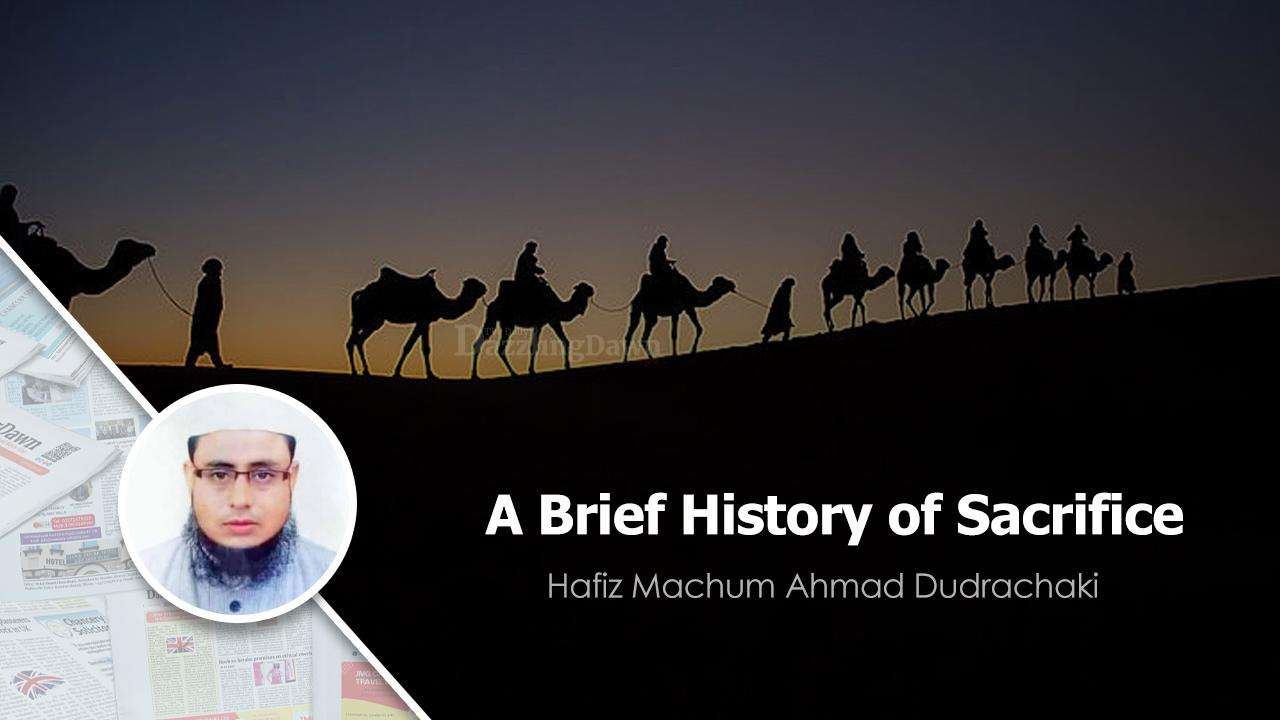Sacrifice: Allah Ta'ala commands, 'Surely (O Prophet!) I have bestowed upon you (full of blessings) Qawsar, so establish prayer for the pleasure of your 'Lord' and sacrifice in His name' (Surah Al-Kawsar-108). /1-2). Prophet (pbuh)Said, "He who does not perform Qurbani despite his ability should not come near the Eidgah" (Ahmad and Ibn Majah). On the authority of Hazrat Ayesha (R.A.), she said, The Prophet (SAW) said, "No good deed of a human being on the Day of Sacrifice is more dear to Allah Ta'ala than making a sacrifice." The horns, fur and hooves of the sacrificial animal will be brought on the Day of Resurrection (in the good deeds of man). The blood of the sacrificial animal reaches the court of God before it falls on the ground. So sacrifice with joy' (Tirmidhi).
Meaning of Qorbani: The word Qorbani commonly used in Bengali in our society means to come close or get close. In Al-Qur'an Surah Al-Maida verse 27 mentions, 'Iz kkarraba-qukurba-nan' i.e. when two of them offered sacrifice or slaughtered an animal, or slaughtered it. It is said in Surah Al-Kawsar, 'Fachalli lirabbika wanhar' meaning, therefore, (O Prophet!) perform prayer in remembrance of your 'Lord' and sacrifice for His pleasure'. Here 'Nahar' means sacrifice. In fact, the word 'Nahar' literally means, Nahar, slaughtering or slaughtering according to special rules, killing by slaughtering or killing or abandoning loved ones by slaughtering.
Brief History of Sacrifice: Sacrifice has been practiced since the beginning of human settlement in the world. The first man on earth is our father and prophet Hazrat Adam (A.S.)Its first child, Qa'il, was disobedient to Allah and his parents. Habeel, the second son of Hazrat Adam (a.s.), the younger brother of Kabeel, was God-fearing and a believer. At that time there were pairs of children by the order of Allah Ta'ala. A son and a daughter. The marriage of the son of the first pair with the daughter of the second pair was valid as per the law of Allah Ta'ala. Qabil was not willing to obey Allah Ta'ala's decree. He wanted to marry the beautiful sister of his twin. In the end, both of them were ordered to offer sacrifice.
And it is said that the one whose sacrifice will be accepted will be the first to marry Zora's beautiful elder sister. In this regard, Allah Ta'ala is declaring, '(O Prophet!)Tell them the story of Adam's two children properly; The story was, when they both offered a sacrifice in the name of Allah, one of them (Habil) had his sacrifice accepted, and the one (Cain) had nothing accepted, (whose sacrifice was not accepted) he said, I Of course you (whoI will kill him (whose sacrifice is accepted) he (whose sacrifice is accepted) said, "Allah accepts sacrifices only from the pious" (Surah al-Ma'ida-5-27).
Because of disobeying the laws of Allah Ta'ala, the first murder in the history of the world was committed by the disobedient children of the parents, the enemies of the religion of Allah, the first victim of Satan in the world, 'Kaabil'. The first time in the history of the world to disobey Allah's laws, regulations or religion and kill people was the enemy of Allah's religion, Kafir 'Kaabil'. This is the work of infidels, infidels and Satan, which is mentioned in several other surahs including Surah al-Maida of Al-Qur'an. The history of sacrifices and killings in the world started from here.
The tradition of sacrifice in Muslim society today is basically the way or Sunnah shown by the Muslim nation or the father of the nation, Hazrat Ibrahim (A.S.). After the centenary of Hazrat Ibrahim (A.S.), the child whom Allah Ta'ala gave him, he was commanded by Allah Ta'ala to sacrifice a piece of his liver to Hazrat Ismail (A.S.), and this sacrifice is still practiced today.
Beginning of the sacrifice of Hazrat Ibrahim (a.): Hazrat Ibrahim (a.) is the father of the Muslim nationNimrud and his tyrants migrated to the country of Syria with his wife Hazrat Sarah on the command of Allah Ta'ala. Unfortunately, the king there was a tyrant and a very fickle person. When the king's men brought the news of the arrival of Hazrat Ibrahim (a.s.) and his beautiful wife Hazrat Sara to the king's court, the king
Arrest them and ask them to come. The king's men brought Hazrat Ibrahim (a.s.) and his wife Sarah to the king's court. The king asked Hazrat Ibrahim (a.s.) who was his wife. Ibrahim (a.s.) thought that if his wife told him, he might kill him, so he said, "She is my religious sister." The king imprisoned Hazrat Ibrahim (a.s.) and left Hazrat Sarah to carry out the evil deeds of the king. The king threatened to kill Hazrat Sara if she did not agree to the bad proposal of the king.
After that, when Hazrat asked for permission to pray two rak'ahs, the king allowed him to pray. At the end of the entire prayer, Hazrat prayed to Allah to protect his chastity. Meanwhile the king became very sick and weak. Seeing the bad situation and thinking that his people would blame Hazrat Sara for the king's death, Hazrat Sara prayed for the King's health. When the same incident happened three times, the king asked for forgiveness from Hazrat Sarah. Seeing the chastity of Hazrat Sarah, another chaste woman sends them away by giving Hazrat Hajera as her maid.
Hazrat Sarah and Hazrat Ibrahim (A.S.) were freed and started living in that country. Hazrat Sara his maid Hazrat Hajera Hazrat Ibrahim (AS)Married with it. Because Hazrat Sarah was 90 years old and Hazrat Ibrahim (A.S.) was 100 years old at that time. Even after a long time of their marriage, Hazrat Sarah could not become a mother. She thought that in her final age, if Allah Ta'ala would kindly grant her husband Hazrat Ibrahim (A.S.) a child. By the grace of Allah, Hazrat Ismail (A.S.) was born in the womb of this Hazrat Hajera.
After the birth of Hazrat Ismail (a.) Hazrat Ibrahim (a.) His wife Hazrat Hajera and Kalija's little son Ismail, by the command of Allah Ta'ala, left them in a secluded place at the foot of Safa and Marwa hills near the Kaaba with some dates and a bottle of water. Hazrat Ibrahim (a.When leaving the place leaving them in this condition, Hazrat Hajera was asking, are you leaving us in this lonely place? Hazrat Ibrahim (a.s.) replied in a low voice, yes. Hazrat Hajera asked again, is this the command of Allah Ta'ala? Hazrat Ibrahim (A.S.) once again replied, yes. Hazrat Hajera stayed there with her baby child, trusting in Allah Ta'ala.
At that time there was no sign of the Kaaba house. The height of the Kaaba house was quite high from the ground. Four sides were broken due to flood caused by rain water. When the food and drink of Hazrat Hajera and her children ran out, Hajera started running to the mountains of Safa and Marwa in search of food and water. When he was returning in despair, he heard a noise. Hajera said, "Who are you? I can hear your voice. If possible, please help me for the sake of Allah." Suddenly he saw a man (angel) near his infant son Ismail (a.s.). When he (the angel) struck the ground with his heel or wing, or the friction of the heel of Hazrat Ismail (A.S.)'s weeping feet, fountains of water began to flow from below. This is the fountain or well that is now known to the Muslim world as Zamzam. Muslims are satisfied with drinking it as a sweet drink. It was also created by the mercy of Allah Ta'ala centered on the Kaaba and at the behest of Hazrat Ismail (A.S.).
Hagar filled her mosque and drank the water to her satisfaction. Hazrat Hajera's hunger was quenched and the necessary milk was provided for her infant son. Because of Hadhrat Hajar's running 7 times continuously on Safa and Marwa hills, Allah SWT has issued a rule for those who perform Hajj and Umrah to run 7 times on Safa Marwa hills. Allah Ta'ala says, 'Surely the two mountains 'Safa and Marwa' are among the signs of Allah Ta'ala, therefore, if any one of you intends to perform Hajj or Umrah, there is nothing wrong with him doing Tawaf or running between these two mountains, because if any If a person does a good deed with devotion in his heart, let himKnows that Allah is Most Gracious and All-Knowing” (Surah Baqarah-2-158).When Hazrat Ishmael (A.S.) was old enough to walk and play, Hazrat Ibrahim (A.S.) was commanded in a dream, Sacrifice your beloved things in the name of Allah. Ibrahim (a.s.) was commanded in a dream and sacrificed 10 camels. Again he saw the same dream. Then Ibrahim (a.s.) again sacrificed 100 camels. Again he saw the same dream and thought, I have no other dear thing except my beloved son Ismail (a.s.) at this moment. Allah Ta'ala says, 'Then I gave him (Hazrat Ibrahim A.K.) the good news of a patient son.
When he was fit to walk with his father, he (Ibrahim A.) said, O my son! I dreamed that I was sacrificing you. So what's your opinion? He (Hazrat Ismail A.) said, O my father! Do what you have been commanded. You will find me one of the patient by the mercy of Allah. Then when they both agreed and surrendered to the will of Allah Ta'ala and Ibrahim (a.s.) laid Ismail (a.s.) down to be slaughtered; Then I called Ibrahim and said, O Ibrahim, you have made your dream come true. Surely it was a test for Ibrahim and Ismail. Then We gave Abraham a great sacrificial animal. By continuing this provision (of sacrifice) for the unborn, I continued his remembrance. Peace be upon Ibrahim. This is how I reward the righteous.' (Surah As Saffat-101-109).
Significance and Importance of Sacrifice: Narrated by Hazrat Zayd Ibn Arqam (RA), he said, Some Companions asked the Prophet (SAW), O Messenger of Allah (SAW), what is Qurbani? The Prophet (PBUH) said, Sacrifice is the Sunnah of the Muslim nation or the father of the nation, Ibrahim (A.S.). They asked again, what is there for us? The Prophet (peace be upon him) said, "For every fur of the sacrificial animal, there is one virtue." They said, sheep have many wools. The Prophet (peace be upon him) said, "For every wool of a sheep, one good will be given, if it is sacrificed with a pure intention" (Ibn Majah). It is stated in a hadith of Abu Dawood Sharif that the Prophet (peace be upon him)He said, the most honorable day in the sight of Allah is the day of sacrifice.
Teaching of sacrifice: Sacrifice is not a matter of pressure or coercion. Man willingly creates the mentality of giving up the most dear things in the hope of attaining the pleasure of his Lord. Such as Hazrat Ibrahim (a.)Just saw in a dream, sacrifice your favorite things for the sake of Allah. And so he was fully prepared to sacrifice his beloved son Hazrat Ismail (A.S.). Money and children are among the most attractive things to people in the world. The teaching of sacrifice is to create this mentality of giving up the illusion of wealth. Sacrifice increases our faith and piety and creates interest in the Hereafter. The Prophet (peace be upon him) instructed, "O people, sacrifice clean and good animals, because these sacrificial animals will be your means of going to Paradise" (Bayhaqi).
Sacrifice is obligatory on all wealthy Muslims. Relatives, neighbours, the poor and the traveler have the right to sacrifice meat. Care should be taken that not a single person in the society is deprived of the sacrificial meat. But the sacrificial skin is the right of only those entitled to Zakat.
Attention about sacrifice: In our society animals such as camel, cow, buffalo are sacrificed in 7 parts. In this case, people with like-mindedness and financial compatibility should perform the sacrifice together. Many also keep a part or two of the sacrificial animal for aqeeqah. Aqeeqah will not agree to this. Two sheep or goats in case of boy and one sheep or goat in case of girl should be determined for Aqeeqah. And it should be remembered that Aqeeqah has nothing to do with Qorbani. Sacrifice is an important component of Eid-ul-Azha and it is joy for the rich and relief for the poor.
May Almighty Allah bless all of us to use this education to make our lives better, Allahumma Ameen.
Author: Islamic thinker writer and columnist Hafiz Machum Ahmad Dudrachaki. Former:- Imam and Khatib Kadmatali Mazar Jame Masjid Sylhet
_3.jpg)







.svg)

